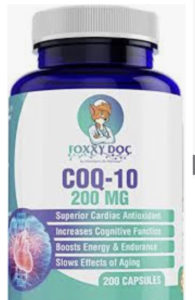Is CO Enzyme Q10 effective at altering Blood Chemistry ?
CORE Physical Therapy In Omaha Explains…
By Dr. Mark Rathjen PT DPT CSCS
CORE Physical Therapy Co-owner
17660 Wright St. 9/10
Omaha NE
402 933 4027
“This meta-analysis demonstrated the promising effects of CoQ10 supplementation on lowering lipid levels among patients with CAD, though it did not affect triglycerides, LDL-cholesterol and Lp(a) levels.” ” The findings showed that taking CoQ10 by patients with CAD significantly decreased total-cholesterol “
This meta analysis shows us that there is some efficacy of the literature of COQ10 and lower lipid levels in individuals with CAD.
IS this significant for me?
If you have Heart disease of markers at higher risk, then research would suggest YES. Make sure to consult your internist before supplement if you are currently taking other meds. Its often well tolerated, with and without other medications involved.
Is there a preventative effect?
This is unknown, but often treatments are not effective in prevention.
Should I take Co Q10, If you have a high risk of heart disease, Yes it has been demonstrated to be safe and well tolerated with otherwise healthy people.
As always, more research for prevention and correlation to decreasing risk would be a nice addition to the research data base.
At CORE Physical Therapy in Omaha, We specialize in the treatment of athletes. We have worked with athletes for a combined 30 years. CORE was established in 2015 by Dr. Mark and Dr. Claire Rathjen is family owned and operated.
We are proud to serve the greater Omaha metro area and its active sports population in Omaha.
Proud winners of the Omaha Choice awards for 2016, 2017, 2018, 2019, 2020, 2021
For More information, Please feel free to contact us http://coreomaha.com/contact/
Please feel free to follow us at https://www.facebook.com/COREomaha/
To get started http://coreomaha.com/getting-started/
For more Blog information http://coreomaha.com/blog/
Youtube Account linked below.
https://www.youtube.com/channel/UCVg8OSN5h-i1n_ykw1Gvahg?view_as=subscriber
The effects of coenzyme Q10 supplementation on lipid profiles among patients with coronary artery disease: a systematic review and meta-analysis of randomized controlled trials
-
Abstract
Background
Chronic inflammation and increased oxidative stress significantly contribute in developing coronary artery disease (CAD). Hence, antioxidant supplementation might be an appropriate approach to decrease the incidence of CAD. This systematic review and meta-analysis was aimed to determine the effects of coenzyme Q10 (CoQ10) supplementation on lipid profile, as one of the major triggers for CAD, among patients diagnosed with coronary artery disease.
Methods
EMBASE, Scopus, PubMed, Cochrane Library, and Web of Science were searched for studies prior to May 20th, 2018. Cochrane Collaboration risk of bias tool was applied to assess the methodological quality of included trials. I-square and Q-tests were used to measure the existing heterogeneity across included studies. Considering heterogeneity among studies, fixed- or random-effect models were applied to pool standardized mean differences (SMD) as overall effect size.
Results
A total of eight trials (267 participants in the intervention group and 259 in placebo group) were included in the current meta-analysis. The findings showed that taking CoQ10 by patients with CAD significantly decreased total-cholesterol (SMD -1.07; 95% CI, − 1.94, − 0.21, P = 0.01) and increased HDL-cholesterol levels (SMD 1.30; 95% CI, 0.20, 2.41, P = 0.02). We found no significant effects of CoQ10 supplementation on LDL-cholesterol (SMD -0.37; 95% CI, − 0.87, 0.13, P = 0.14), lipoprotein (a) [Lp(a)] levels (SMD -1.12; 95% CI, − 2.84, 0.61, P = 0.20) and triglycerides levels (SMD 0.01; 95% CI, − 0.22, 0.24, P = 0.94).
Conclusions
This meta-analysis demonstrated the promising effects of CoQ10 supplementation on lowering lipid levels among patients with CAD, though it did not affect triglycerides, LDL-cholesterol and Lp(a) levels.
Keywords: Coenzyme Q10, Lipid profiles, Coronary artery disease, Meta-analysis



 5
5